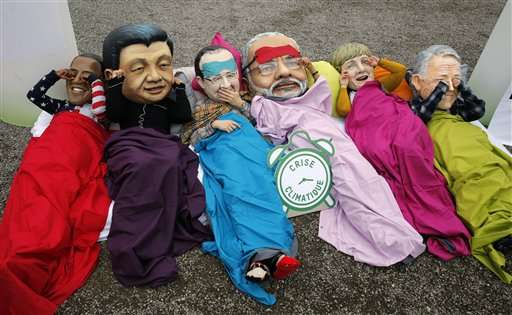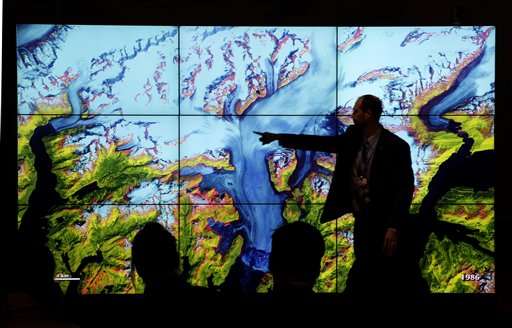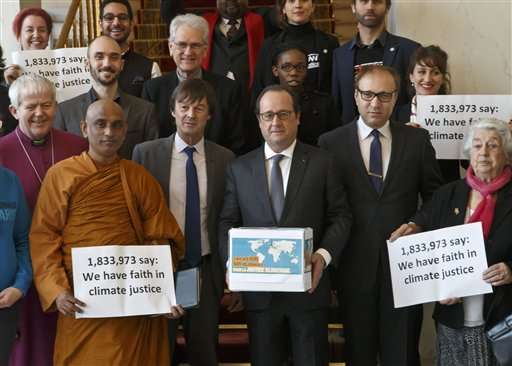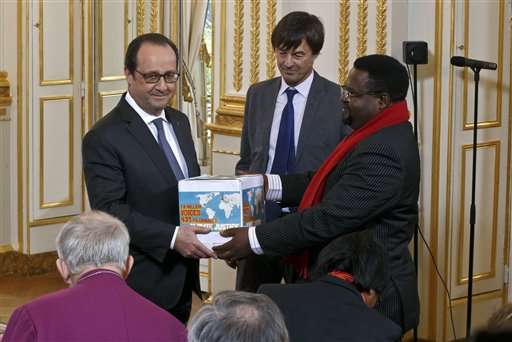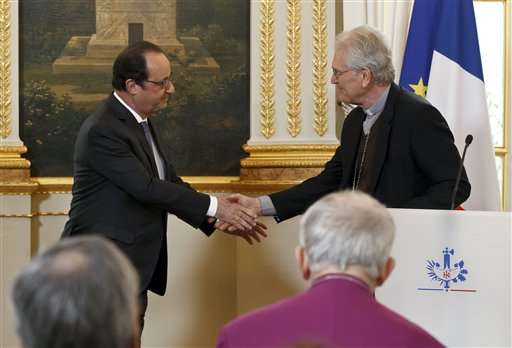Oxfam activists wear masks of from left, U.S. President Barack Obama, Chinese President Xi Jinping, French President Francois Hollande, India's Prime Minister Narendra Modi, German Chancellor Angela Merkel and Australia's Prime Minister Malcolm Turnbull as they stage a protest during the COP21, United Nations Climate Change Conference in Le Bourget, north of Paris, Thursday, Dec. 10, 2015. (AP Photo/Christophe Ena)
Sleep-deprived and increasingly tense, diplomats and climate negotiators outside Paris struggled Thursday to narrow down a 29-page draft of an unprecedented deal to tackle climate change— but countries remained at odds on critical issues a day before the organizers' deadline for an agreement.
Small island nations demanded firmer rich country promises to help cope with future damage from rising seas and rougher storms. A top European negotiator accused China of blocking proposals for countries to update their carbon pollution targets every five years.
And negotiators are still arguing over whether advanced developing countries such as China and oil-rich Arab nations should join industrialized countries in providing financial aid to poor countries trying to reduce carbon emissions that scientists say are warming the planet.
U.S. Secretary of State John Kerry said the talks are "getting down to the critical stage," as he held meetings Thursday with top officials from two major developing nations—Brazil and India—and other negotiators. The Obama administration is working for a deal that reflects its concerns about global warming but doesn't require approval from a skeptical Congress.
Diplomats are trying to reach the biggest accord to date to trim emissions and slow global warming. The last global agreement, the 1997 Kyoto Protocol, only required rich countries to cut emissions, while this one would require all countries to pitch in.
"I am hopeful and I'm reasonably optimistic that we will be able to have for the first in the history of the United Nations a universal and very ambitious climate change agreement, which will make our human beings lives healthier and more prosperous," U.N. Secretary-General Ban Ki-moon said Thursday at the Paris talks.
One sticking point is language in the draft document for countries to update emissions targets every five years.
People attend a climate conference at the U.S. pavilion during the COP21, United Nations Climate Change Conference in Le Bourget, north of Paris, Thursday, Dec. 10, 2015. (AP Photo/Christophe Ena)
EU Climate Commissioner Miguel Arias Canete told reporters Thursday "without the five-year cycles, the agreement is meaningless."
"Unless you come back every five years to update your targets, you can never reach the long-term goal," he said.
Canete said Chinese negotiators are opposed to making five-yearly updates a requirement in the agreement even though they agreed to such reviews before the Paris talks.
Poor, low-lying nations are keeping up pressure for rich countries to do more to help poor countries shift to renewable energy and pay for damage by future climate turmoil.
"Our contribution to CO2 emissions is 0.000001 percent. So we are entirely innocent. We are more victims ... than culprits in that," said Jose Ramos-Horta, former president of Timor-Leste and in Paris negotiating with the least-developed countries bloc.
Climate negotiations continued until about 5 a.m. Thursday (0400 GMT, 11 p.m. EST Wednesday) before resuming midmorning, and a new draft accord is expected to be released sometime during the day, a French diplomat said.
France's President Francois Hollande, center, holds a box containing an international petition to support the climate talks as he poses with religious figures for a group photo at the Elysee Palace in Paris, Thursday, Dec. 10, 2015. France's President Francois Hollande met religious figures lobbying against climate change on the side line of the COP21, United Nations Climate Change Conference in Le Bourget. (AP Photo/Michel Euler, Pool)
The French organizers of the two-week talks want a final agreement by Friday night, though U.N. climate conferences rarely end on time.
This time is different from past talks, because the French organizers pushed countries to set their own emissions targets before the Paris conference, and the U.S. and China, who have clashed over climate in the past, bridged key differences earlier this year.
"The outlook is positive, but there is still a lot of work to be done," said Elina Bardram, head of the EU climate delegation. The draft is "still too heavy."
Cameroon's Augustine Njamnshi of the Pan African Climate Justice Alliance, right, hands over to France's President Francois Hollande, left, a box containing an international petition to support the climate talks while French environmentalist Nicolas Hulot stands between at the Elysee Palace in Paris, Thursday, Dec. 10, 2015. France's President Francois Hollande met religious figures lobbying against climate change on the side line of the COP21, United Nations Climate Change Conference in Le Bourget. (AP Photo/Michel Euler, Pool)
Chinese negotiator Gao Feng was one of many suggesting the talks won't finish on time. "Friday or maybe Saturday, I think we will get it."
Another unresolved question for the deal is its long-term goal for fossil fuels—oil, coal and gas—that are the source of most man-made emissions and provide most of the world's energy today. Replacing them with renewable sources like wind and solar power requires big investments, which poor countries say they can't afford without help.
The document doesn't settle the sensitive question of whether advanced developing countries such as China and oil-rich Arab nations should join industrialized countries in providing financial aid.
France's President Francois Hollande, left, shakes hands with Bishop of Brazil Leonardo Ulrich Steiner as he meets religious figures at the Elysee Palace in Paris, Thursday, Dec. 10, 2015. France's President Francois Hollande met religious figures lobbying against climate change on the side line of the COP21, United Nations Climate Change Conference in Le Bourget. (AP Photo/Michel Euler, Pool)
© 2015 The Associated Press. All rights reserved.
